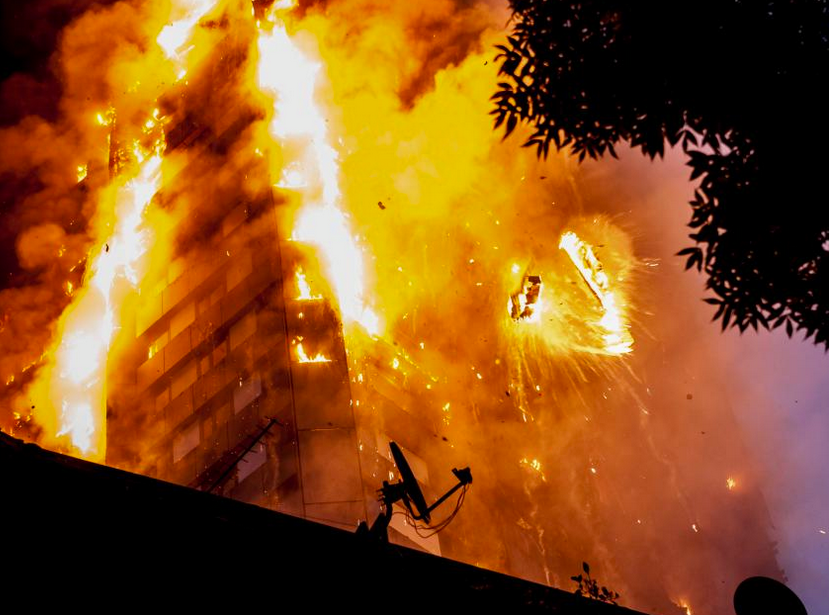Note: This oped was originally published in the Edmonton Journal.
Brian Jean says he wants to “reduce job-killing government red tape by 33 per cent, and put in place a one-for-one rule after that where any new regulation has to have one at least as onerous taken away.”
Doug Schweitzer says he “would eliminate two existing business regulations for every new business regulation.”
I suggest that these two candidates for the leadership of Alberta’s new United Conservative Party (UCP) try saying that in Royal Borough of Kensington and Chelsea, site of the tragic fire that killed up to 80 people in Grenfell Tower.
Conservative politicians in the U.K. used the same language to attack regulations which they saw as obstacles to businesses being able to maximize profits. The U.K. Tory government issued a “red-tape challenge” that required civil servants abolish two regulations for every new regulation introduced.
Only a few months before the Grenfell Tower blaze, U.K. Tory cabinet ministers were boasting about how they had slashed fire regulations. For some companies, the time to complete fire-safety inspections was cut to 45 minutes from six hours.
Since the Grenfell Tower fire in June, attention has turned to the role reduced “red tape” played in the blaze and how it contributed to the number of dead. Industry leaders, fire-safety experts and tenants have all said there was a failure of government oversight at the tower.
In 2005, the law was changed to allow for building owners to self-police on fire-safety standards rather than use government inspectors. While the fire risk from the type of cladding used on the tower was well-known and its use was banned in many countries, restrictions on its use in Britain were successfully resisted by industry because using safer materials was too costly.
“Fire-resistant walls are not economically viable for the prevention of fire spread from floor to floor of a building,” said Stephen Ledbetter, director of the industry group Centre for Window and Cladding Technology.
Think about that for a second. Life-saving measures adopted in other jurisdictions were not “economically viable.” Tell that to the Grenfell Tower survivors.
What Brian Jean and Doug Schweitzer choose to ignore is that what they see as “red tape” and a hindrance to profit is, in fact, often vitally important regulation designed to save lives. No one knows that better than Health Sciences Association of Alberta (HSAA) members who work as health-and-safety inspectors.
They are out there every day trying to ensure that the minimal safety standards in Alberta — we already have the least health-and-safety regulations in Canada — are enforced. They’re on the front lines, making sure buildings, homes, lakes, swimming pools, restaurants and a host of other places and facilities are as safe as possible.
What happens when those regulations, those safety standards, are weakened even further by a UCP government? The risk of an Alberta tragedy will increase.
When that tragedy strikes, how will Alberta be able to react?
That’s the next problem with the likely UCP strategy that we’ve seen so far. All the announced or potential leadership candidates want to slash public-sector jobs, to dramatically undermine the ability to provide services.
If there’s a Grenfell Tower fire here, will our emergency medical services (EMS) be able to cope? As patients are rushed to hospitals, will overburdened emergency departments be able to cope? As Albertans grieve after the tragedy, will there be enough mental-health and social workers to care for them?
I fear not.
As British activist and singer Billy Bragg said on Facebook with a photo of Grenfell Tower up in flames: “The next time you hear someone complaining about health and safety, or whinging (sic) about too much red tape, or demanding that for every new regulation introduced, three are removed; when you hear someone say that it just costs too much to install sprinklers or fire doors or use fire-resistant materials, that profits are more important than safety; when firefighters, police and medical staff suffer cuts; when you are told that we can have low taxes and good public services — think of this image. And pray for the people of Grenfell Tower.”
Mike Parker is the president of the Health Sciences Association of Alberta, which represents about 25,000 health-care professionals.
